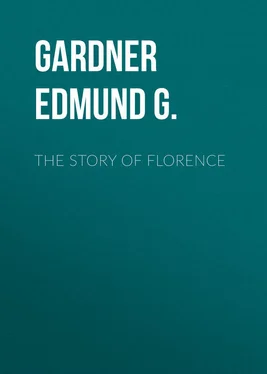Edmund Gardner - The Story of Florence
Здесь есть возможность читать онлайн «Edmund Gardner - The Story of Florence» — ознакомительный отрывок электронной книги совершенно бесплатно, а после прочтения отрывка купить полную версию. В некоторых случаях можно слушать аудио, скачать через торрент в формате fb2 и присутствует краткое содержание. Жанр: История, foreign_antique, foreign_prose, на английском языке. Описание произведения, (предисловие) а так же отзывы посетителей доступны на портале библиотеки ЛибКат.
- Название:The Story of Florence
- Автор:
- Жанр:
- Год:неизвестен
- ISBN:нет данных
- Рейтинг книги:3 / 5. Голосов: 1
-
Избранное:Добавить в избранное
- Отзывы:
-
Ваша оценка:
- 60
- 1
- 2
- 3
- 4
- 5
The Story of Florence: краткое содержание, описание и аннотация
Предлагаем к чтению аннотацию, описание, краткое содержание или предисловие (зависит от того, что написал сам автор книги «The Story of Florence»). Если вы не нашли необходимую информацию о книге — напишите в комментариях, мы постараемся отыскать её.
The Story of Florence — читать онлайн ознакомительный отрывок
Ниже представлен текст книги, разбитый по страницам. Система сохранения места последней прочитанной страницы, позволяет с удобством читать онлайн бесплатно книгу «The Story of Florence», без необходимости каждый раз заново искать на чём Вы остановились. Поставьте закладку, и сможете в любой момент перейти на страницу, на которой закончили чтение.
Интервал:
Закладка:
And at the end of August, when Dante had left office, Guido returned to Florence with the rest of the Bianchi, only to die. For more than a year the "white" burghers were supreme, not only in Florence, but throughout a greater part of Tuscany; and in the following May they procured the expulsion of the Blacks from Pistoia. But Corso Donati at Rome was biding his time; and, on November 1st, 1301, Charles of Valois, brother of King Philip of France, entered Florence with some 1200 horsemen, partly French and partly Italian,–ostensibly as papal peacemaker, but preparing to "joust with the lance of Judas." In Santa Maria Novella he solemnly swore, as the son of a king, to preserve the peace and well-being of the city; and at once armed his followers. Magnates and burghers alike, seeing themselves betrayed, began to barricade their houses and streets. On the same day (November 5th) Corso Donati, acting in unison with the French, appeared in the suburbs, entered the city by a postern gate in the second walls, near S. Piero Maggiore, and swept through the streets with an armed force, burst open the prisons, and drove the Priors out of their new Palace. For days the French and the Neri sacked the city and the contrada at their will, Charles being only intent upon securing a large share of the spoils for himself. But even he did not dare to alter the popular constitution, and was forced to content himself with substituting "black" for "white" burghers in the Signoria, and establishing a Podestà of his own following, Cante de' Gabbrielli of Gubbio, in the Palace of the Commune. An apparently genuine attempt on the part of the Pope, by a second "peacemaker," to undo the harm that his first had done, came to nothing; and the work of proscription commenced, under the direction of the new Podestà. Dante was one of the first victims. The two sentences against him (in each case with a few other names) are dated January 27th, 1302, and March 10th–and there were to be others later. It is the second decree that contains the famous clause, condemning him to be burned to death, if ever he fall into the power of the Commune. At the beginning of April all the leaders of the "white" faction, who had not already fled or turned "black," with their chief followers, magnates and burghers alike, were hounded into exile; and Charles left Florence to enter upon an almost equally shameful campaign in Sicily.
Dante is believed to have been absent from Florence on an embassy to the Pope when Charles of Valois came, and to have heard the news of his ruin at Siena as he hurried homewards–though both embassy and absence have been questioned by Dante scholars of repute. His ancestor, Cacciaguida, tells him in the Paradiso :–
"Tu lascerai ogni cosa diletta
più caramente, e questo è quello strale
che l'arco dello esilio pria saetta.
Tu proverai sì come sa di sale
lo pane altrui, e com'è duro calle
lo scendere e il salir per l'altrui scale." 10 10 "Thou shall abandon everything beloved most dearly; this is the arrow which the bow of exile shall first shoot. "Thou shalt make trial of how salt doth taste another's bread, and how hard the path to descend and mount upon another's stair." – Wicksteed's translation.
The rest of Dante's life was passed in exile, and only touches the story of Florence indirectly at certain points. "Since it was the pleasure of the citizens of the most beautiful and most famous daughter of Rome, Florence," he tells us in his Convivio , "to cast me forth from her most sweet bosom (in which I was born and nourished up to the summit of my life, and in which, with her good will, I desire with all my heart to rest my weary soul and end the time given me), I have gone through almost all the parts to which this language extends, a pilgrim, almost a beggar, showing against my will the wound of fortune, which is wont unjustly to be ofttimes reputed to the wounded."
Attempts of the exiles to win their return to Florence by force of arms, with aid from the Ubaldini and the Tuscan Ghibellines, were easily repressed. But the victorious Neri themselves now split into two factions; the one, headed by Corso Donati and composed mainly of magnates, had a kind of doubtful support in the favour of the populace; the other, led by Rosso della Tosa, inclined to the Signoria and the popolo grosso . It was something like the old contest between Messer Corso and Vieri dei Cerchi, but with more entirely selfish ends; and there was evidently going to be a hard tussle between Messer Corso and Messer Rosso for the possession of the State. Civil war was renewed in the city, and the confusion was heightened by the restoration of a certain number of Bianchi, who were reconciled to the Government. The new Pope, Benedict XI., was ardently striving to pacify Florence and all Italy; and his legate, the Cardinal Niccolò da Prato, took up the cause of the exiles. Pompous peace-meetings were held in the Piazza di Santa Maria Novella, for the friars of St Dominic–to which order the new Pope belonged–had the welfare of the city deeply at heart; and at one of these meetings the exiled lawyer, Ser Petracco dall'Ancisa (in a few days to be the father of Italy's second poet), acted as the representative of his party. Attempts were made to revive the May-day pageants of brighter days–but they only resulted in a horrible disaster on the Ponte alla Carraia, of which more presently. The fiends of faction broke loose again; and in order to annihilate the Cavalcanti, who were still rich and powerful round about the Mercato Nuovo, the leaders of the Neri deliberately burned a large portion of the city. On July 20th, 1304, an attempt by the now allied Bianchi and Ghibellines to surprise the city proved a disastrous failure; and, on that very day (Dante being now far away at Verona, forming a party by himself), Francesco di Petracco–who was to call himself Petrarca and is called by us Petrarch–was born in exile at Arezzo.
This miserable chapter of Florentine history ended tragically in 1308, with the death of Corso Donati. In his old age he had married a daughter of Florence's deadliest foe, the great Ghibelline champion, Uguccione della Faggiuola; and, in secret understanding with Uguccione and the Cardinal Napoleone degli Orsini (Pope Clement V. had already transferred the papal chair to Avignon and commenced the Babylonian captivity), he was preparing to overthrow the Signoria, abolish the Ordinances, and make himself Lord of Florence. But the people anticipated him. On Sunday morning, October 16th, the Priors ordered their great bell to be sounded; Corso was accused, condemned as a traitor and rebel, and sentence pronounced in less than an hour; and with the great Gonfalon of the People displayed, the forces of the Commune, supported by the swordsmen of the Della Tosa and a band of Catalan mercenaries in the service of the King of Naples, marched upon the Piazza di San Piero Maggiore. Over the Corbizzi tower floated the banner of the Donati, but only a handful of men gathered round the fierce old noble who, himself unable by reason of his gout to bear arms, encouraged them by his fiery words to hold out to the last. But the soldiery of Uguccione never came, and not a single magnate in the city stirred to aid him. Corso, forced at last to abandon his position, broke through his enemies, and, hotly pursued, fled through the Porta alla Croce. He was overtaken, captured, and barbarously slain by the lances of the hireling soldiery, near the Badia di San Salvi, at the instigation, as it was whispered, of Rosso della Tosa and Pazzino dei Pazzi. The monks carried him, as he lay dying, into the Abbey, where they gave him humble sepulchre for fear of the people. With all his crimes, there was nothing small in anything that Messer Corso did; he was a great spirit, one who could have accomplished mighty things in other circumstances, but who could not breathe freely in the atmosphere of a mercantile republic. "His life was perilous," says Dino Compagni sententiously, "and his death was blame-worthy."
Читать дальшеИнтервал:
Закладка:
Похожие книги на «The Story of Florence»
Представляем Вашему вниманию похожие книги на «The Story of Florence» списком для выбора. Мы отобрали схожую по названию и смыслу литературу в надежде предоставить читателям больше вариантов отыскать новые, интересные, ещё непрочитанные произведения.
Обсуждение, отзывы о книге «The Story of Florence» и просто собственные мнения читателей. Оставьте ваши комментарии, напишите, что Вы думаете о произведении, его смысле или главных героях. Укажите что конкретно понравилось, а что нет, и почему Вы так считаете.












